A Dean's Perspective with Dr. Kimberly Quiett, School of Nursing
by Kate Day
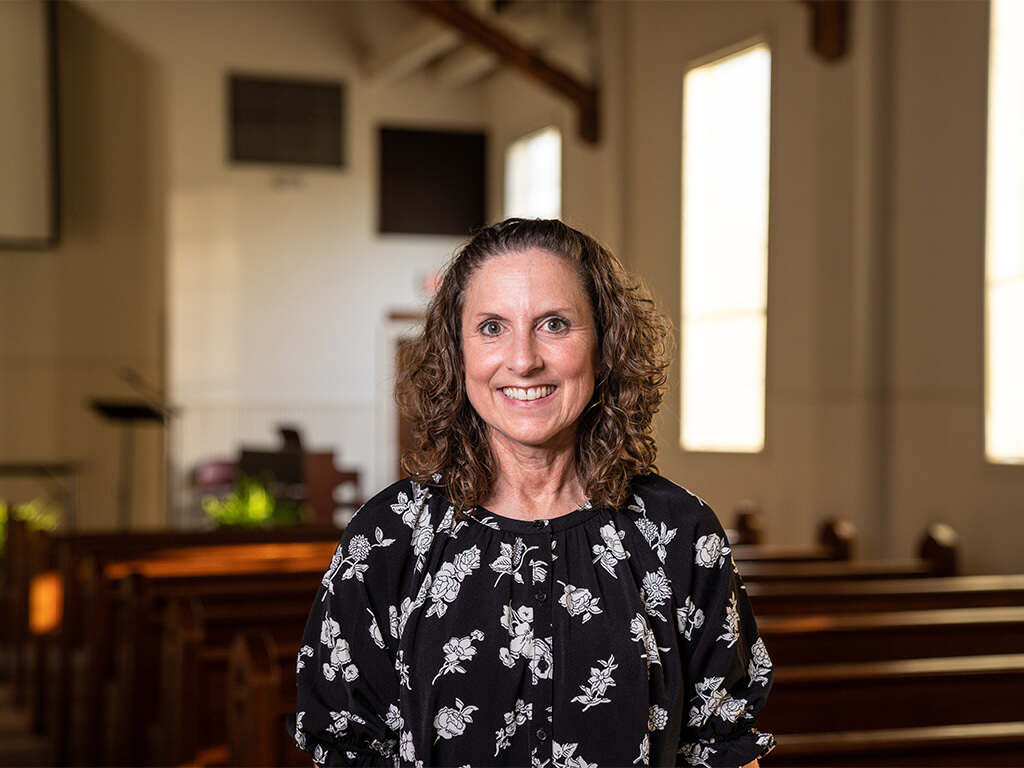 The average American life span is 78 years. That’s 41,000,000 minutes. Tens of millions of experiences.
The average American life span is 78 years. That’s 41,000,000 minutes. Tens of millions of experiences.
With a memory-mountain that massive, it’s no surprise the vast majority are forgotten. In fact, neurological research says that forgetfulness is our ‘default setting.’ That a healthy brain quickly forgets most of what passes into conscious awareness, leaving the average person to recall no more than ten events for any given year of life. The insignificant ones seem to vaporize as time goes by. We mourn them not. But some… some are a different story. There are some moments in time that are wrapped in enough purpose that we carry them always. We remember.
The ones that stick share a common thread. They are laced with significance. An emotion magnifies the experience and more deeply etches into our psyche, our spirit. These are the moments filled with purpose. The best of these are encased in light.
This moment is one of those. And that’s what streams in on this particular evening. Light.
Golden light pours through the western-facing wood sash windows of an old, vernacular structure. It’s a simple building, one with its own memorable story.
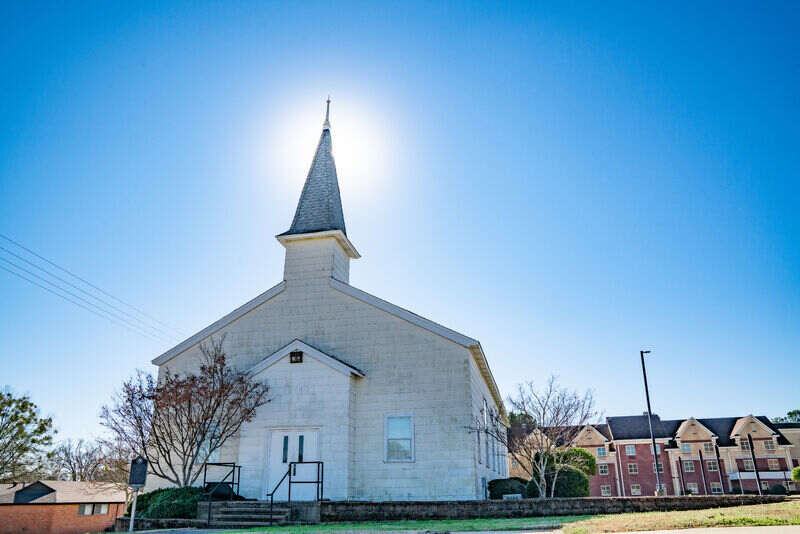
Those familiar with campus, or who paused to read the historical marker out front, know its provenance as the chapel of WWII’s Harmon General Hospital. An ecumenical chapel, its walls heard the prayers of Protestant, Catholic, and Jewish clergy from January 1943 to December 1945. Prayers undoubtedly of grief and lament; for comfort, peace, and hope. Prayers of nurses, physicians, wounded soldiers, and families seeking an ounce of lightness during one of the heaviest seasons in American history.
Wooden beams and pews bring warmth to its smooth white walls. Lantern-like fixtures hang from above, but it’s tough to tell if they’re even on, as much natural light is streaming in. Its pattern stripes the space in golden diagonal bands, as if a warm, bright presence is bearing witness to the moment. It touches at least a portion of every wooden pew in this historic space, gracing the shoulders of mostly strangers, brought together for an hour of common purpose. It illuminates their profiles. Their smiles.
And they’re smiling for good reason. This moment is kind of a big deal.
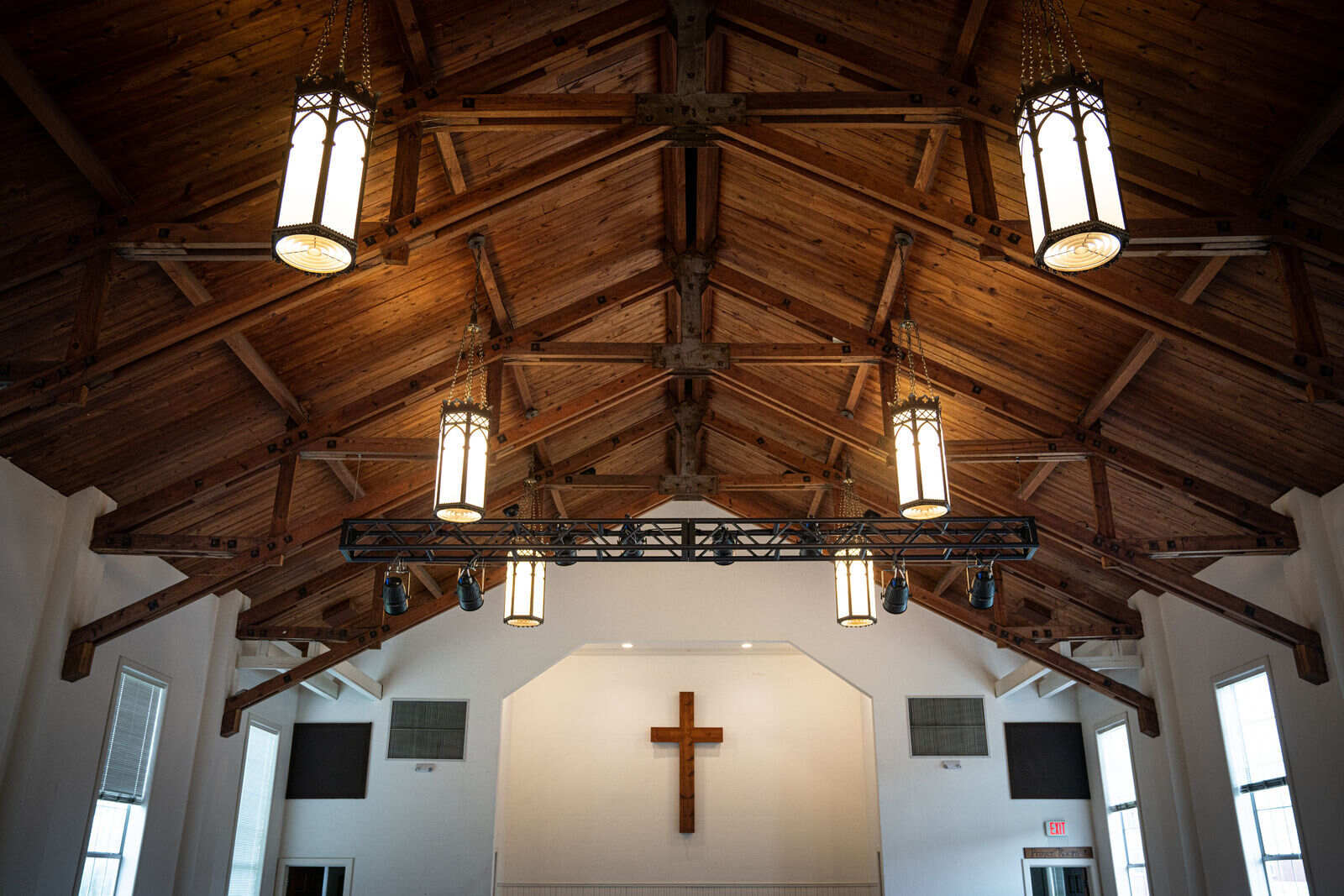
Every May, Dr. Kimberly Quiett leads the latest round of LeTourneau University’s graduating nursing seniors through a rite of passage that’s part ritual, part celebration, and wholly meaningful. In an instant, these seniors are bonded with the entire globe-spanning league of nurse professionals as they receive a pin from another nurse of their choosing—usually a mentor, faculty member, or other nurse related or special to them—and recite The Nightingale Pledge. This pledge, a modified version of the Hippocratic Oath, is a declaration of ethics and principled standards for the nursing profession. Composed in 1893 and crafted by nursing profession reformer Lystra Gretter, this pledge was named in honor of the founder of modern nursing, Florence Nightingale. Here it is in its entirety:
“I solemnly pledge myself before God and in the presence of this assembly, to pass my life in purity and to practice my profession faithfully. I will abstain from whatever is deleterious and mischievous, and will not take or knowingly administer any harmful drug. I will do all in my power to maintain and elevate the standard of my profession, and will hold in confidence all personal matters committed to my keeping and all family affairs coming to my knowledge in the practice of my calling. With loyalty will I endeavor to aid the physician in his work, and devote myself to the welfare of those committed to my care.”
This pledge is noble and good. But is it truly enough? Encounter any LeTourneau University faculty member, drop in a lab, or witness one of our students engaging in patient care for any length of time, and something is immediately striking. This pledge is a mere baseline.
Odds are, its namesake would agree.
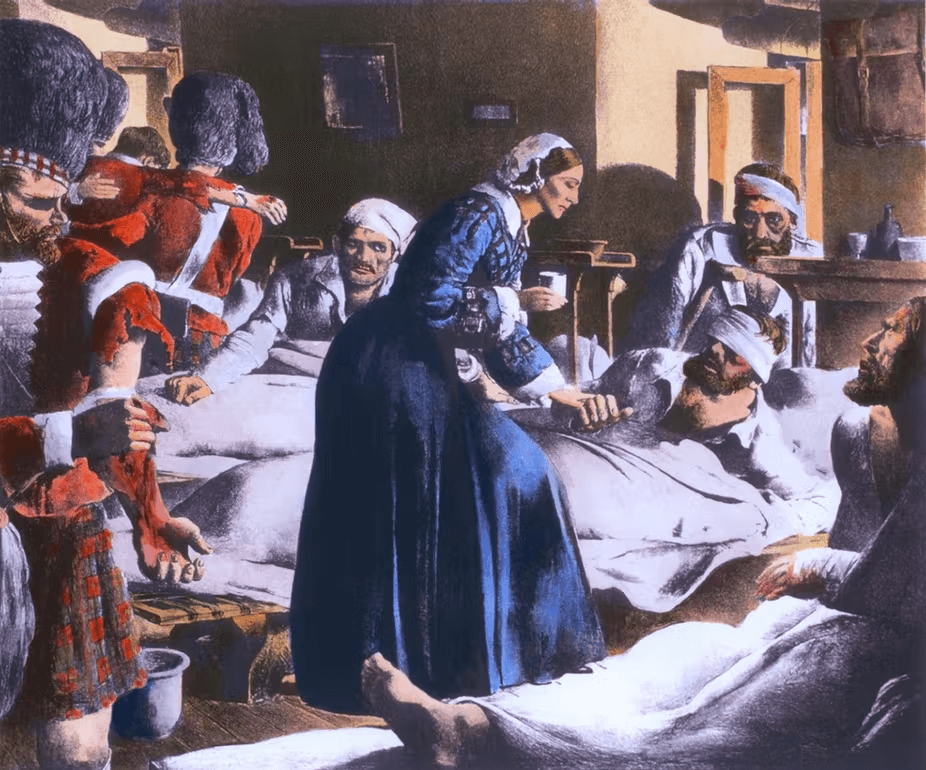 By all accounts, Florence Nightingale was no-nonsense, a brilliant statistician, practical, and brave. Her contributions to revolutionizing patient care began in the 1850s. She had already achieved an admirable career supervising nurses, tending to ailing governesses, and warding off a cholera outbreak. It was only then, when she chose to leave London and set foot in a hospital of wounded soldiers in Crimea—one that can only be described as a cesspool—that her work became legend.
By all accounts, Florence Nightingale was no-nonsense, a brilliant statistician, practical, and brave. Her contributions to revolutionizing patient care began in the 1850s. She had already achieved an admirable career supervising nurses, tending to ailing governesses, and warding off a cholera outbreak. It was only then, when she chose to leave London and set foot in a hospital of wounded soldiers in Crimea—one that can only be described as a cesspool—that her work became legend.
Her practices improved hygiene practices, transformed the standards of patient services, lowered death rates by two-thirds, and resulted in a transformation of nursing training. Her work was exceptional.
She cared for soldiers day and night, an oil lamp guiding her way down darkened hallways as she ministered to patient after patient. Her care was unparalleled.
These soldiers dubbed her ‘The Lady of the Lamp.’ And history will never forget her.
Neither will our graduates. After their scrubs are donned with their pin, symbolizing entry into the world of caregiving, they each light a candle, another longstanding tradition of graduating nurses everywhere, to commemorate Nightingale’s nighttime aid to her patients. As the light from each of these small flames catches their faces, you can tell. That this light, to them, has a much deeper meaning.
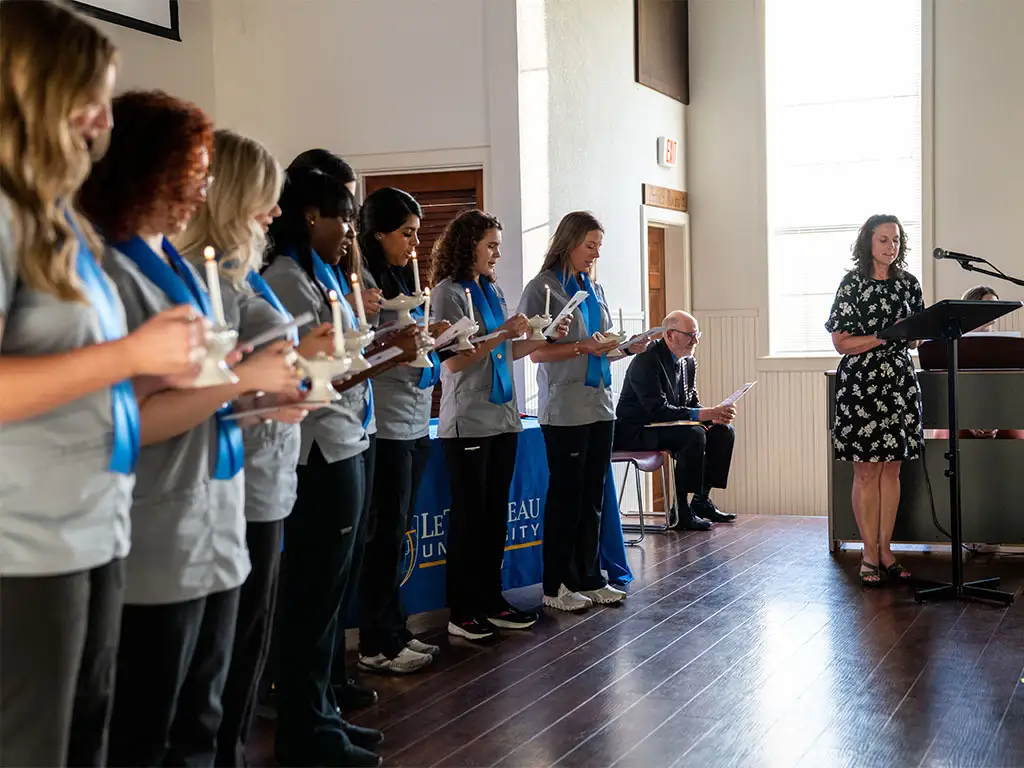
Florence Nightingale was so genuinely called to nursing at the age of 16 that she sacrificed her parents’ approval and the comfortable aristocratic life she was born to—all for a path of hard work in a field where women weren’t generally accepted, a path on which she perpetually sought out suffering.
The ‘why’ was clear for her. It was this, and only this: She believed it was her divine purpose.
In Nightingale’s personal pledge, “aiding the physician in his work” would’ve meant “aiding the Physician in His work.” It was not a mere pledge before God. It was a pledge to Him. For Him. Because of Him.
It's safe to say, the profession of nursing has the Gospel written all over it. Drawing nearer to the mess and pain of humanity, rather than shying away from it, is a Jesus move, pure and simple. But boy, oh boy, can you tell the difference in a nurse who feels this in their bones and writes it on their heart, and one who doesn’t.
LeTourneau University’s School of Nursing exists to train nurses with divine purpose—in a day and age in which the field looks dramatically different than Nightingale’s nineteenth century. Yet, at its core, is the very same. After a recent conversion with Dr. Quiett, this truth was clearer than ever.
The Draw
There are themes that surface when you talk to nurses. One of them is sweat. Struggle. This is something Quiett knows: You don’t pick or stick with a career in nursing for ease. Whatever job can be considered ‘tidy,’ well, it’s the opposite.
Hospitals hold the chaos of raw humanity, encountering people at their most vulnerable, at the height of emotion as they themselves encounter the unexpected. It’s the full spectrum: trauma, shock, grief, heartbreak—as well as relief and elation. That fact alone begs the big question when it comes to a life of walking onto floors and into lives not knowing what slices of that spectrum are about to greet you. Why?
“Interestingly, I didn’t plan to be a nurse. I’m not one of those people who always thought I would be a nurse. My family wasn’t ‘college people.’ But I had an aunt that was a nurse, and I knew women could be nurses or educators.”
The catalyst was practical. She didn’t get into nursing school the first time around, but after a few extra math classes, the second try was the charm. The calling, though, snuck up on her.
“Almost immediately after starting nursing school, I thought, ‘hey, this is something I can do.’ I love the fact that it’s very mission and ministry driven; so, at that point I kind of worked into it as a calling. I didn’t feel that way at first. But once I got into it and saw what I would be doing as a nurse, I felt like it was where I was supposed to be. That’s for sure.”
It was the doing that made the difference. And it’s where she’s stayed. Quiett became a nurse in 1991 and was engaged in bedside nursing until she moved to LeTourneau in 2013.
“I’ve been an educator since 2003, but I always still worked in the hospital, so I’ve been in the nursing field my entire career, up until nine years ago. I’ve done everything; I’ve been at the bedside, I’ve been a charge nurse, I’ve coordinated care, I’ve been a clinical nurse specialist, I’ve been a corporate nurse, I’ve been an educator… I’ve been all sorts of things, but I’ve never not been a nurse.”
The shift to education was a big one.
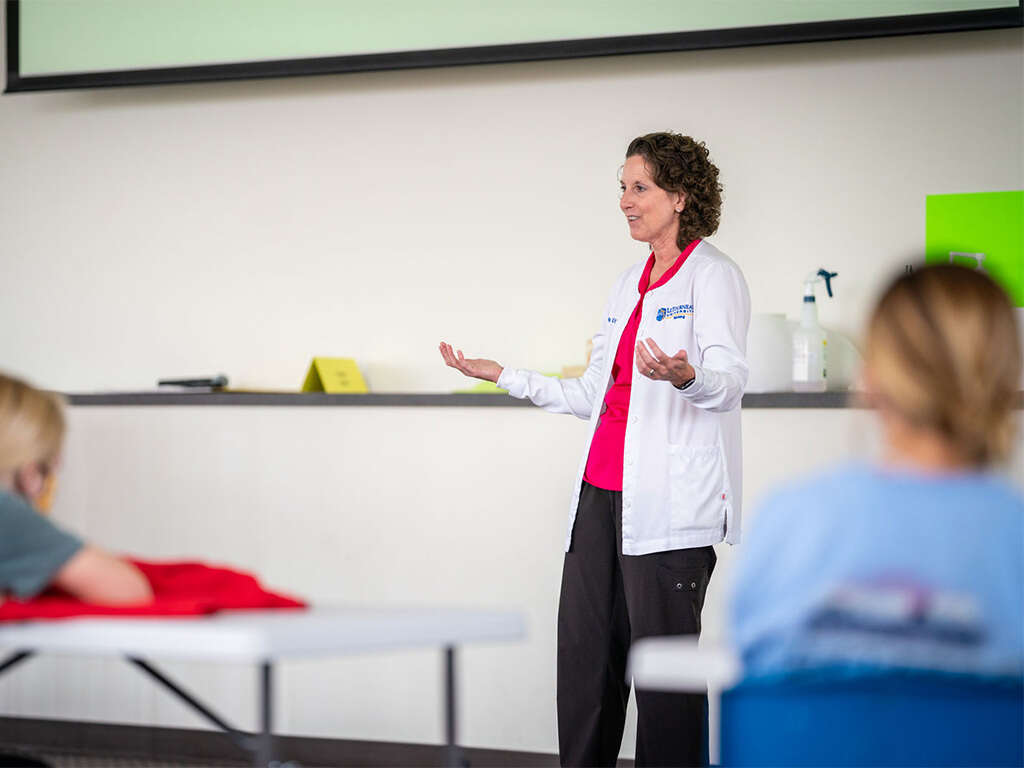 “You almost let a part of yourself die when leave the bedside, leave taking care of patients in some way. In fact, I’m currently seeking some way to be back in patient care, in addition to my current role, so I maintain skills and maintain that patient-centeredness. I think that’s also really important from an educational perspective, because it keeps me current.”
“You almost let a part of yourself die when leave the bedside, leave taking care of patients in some way. In fact, I’m currently seeking some way to be back in patient care, in addition to my current role, so I maintain skills and maintain that patient-centeredness. I think that’s also really important from an educational perspective, because it keeps me current.”
What would make a nurse who feels so soulfully connected to patient care, start patiently training nurses? Simple:
"I see nursing as such a ministry opportunity that I want the next generation of nurses to see it the same way I do.”
And it turns out, she also sees it a lot like Nightingale did, whose ‘let’s try this, see what happens, and learn from it’ method is still alive and well.
“I tend to teach research, and Florence Nightingale was kind of the first researcher. I always use her as an example in research classes. She saw her patients suffering and put them out in sunlight, and she kept them clean, and she washed their linens, and all this stuff, and guess what? They fared better. So, she goes ‘okay, everybody has to keep doing these things,’ right? She was not only ‘the lady with the lamp.’ She was a nurse researcher in her own right. She kept records, so that she could do stats and she could figure out that what she was doing really worked. And I think nurses don’t often think about being a researcher. There is a field of research that nurses in particular go into, but every nurse is a nurse researcher in some capacity, because we have to figure out what works for our patients. I’m pretty sure in Florence Nightingale’s time she didn’t call it ‘evidence-based practice,’ but that’s what it is today.”
As our conversation continues, Quiett sheds light on layer after layer of what it means to be a nurse today, why it matters, and why a place like LeTourneau was built to produce more of them.
On Divine Calling
When it comes to nursing as divine calling, Quiett always comes back to one thing, and one thing only—the foundation: we are all made in the image of God.
“I just always have to go back to that. And, I do. I go back to it with students every time. Because that truth is so foundational to us being called to care for God’s people. And when I say God’s people, I don’t mean other Christians. I mean Jesus Christ came to save everybody. And just having that as a foundation, I think is just… everything.”
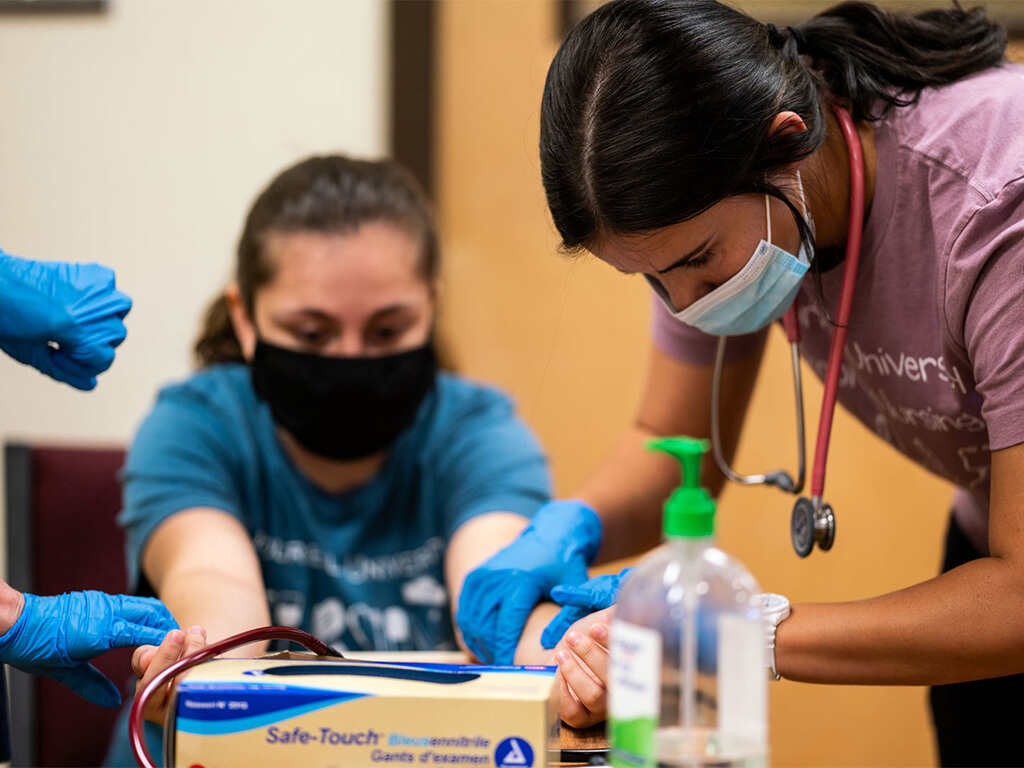
People ask ‘do you have to be a Christian to be a nurse?’ Absolutely not. There are so many non-Christian nurses out there. But even non-Christian nurses see themselves as carrying out some kind of ministry. Now, they may not see it as a ministry in the redeeming process of God’s love, but they see it as serving others. So even non-Christian nurses see their profession as a service profession. But I think it all comes down to that ‘why’, that light, that says ‘we are taking care of people in the image of God.’
It’s amazing enough that we’re made in the image of God and He loved us enough to make us in His image, but it’s even more amazing that He allows some of us to be in professions where we are allowed to see the intricacies of how He made the human body and how it works, and then to help keep it healthy.”
You don’t even have to be a Christian to understand that our bodies are made in such a creative and crazy way. A lot of times people, particularly Christians, fall into this group… ‘I’m just going to believe that God will heal me.’ God might heal you, miraculously, without anything. God also might heal you through medicine or through procedure. God may heal you through the hands of someone who touches you. God can heal people however he wants to. But healing also might not happen here, right? We might also just be healed ultimately. But nurses get to take part in that. That, to me, is just the basis of the whole profession. That we’re taking care of people made in the image of God. And I think that’s just a crazy thought. I don’t know why God entrusted me or any other nurse to get to do that.”
On Technology
Quiett admits that balance is a tricky trait for nurses. It’s easy to lose yourself in the demands of the day, caregiving without caring for self. But the most critical balance is the one that made Nightingale’s legacy so lasting. The balance of excellence and compassion. As standards of excellence evolve in an industry where it’s rare to identify a patient-care exchange that doesn’t involve technology, Quiett compels us, and her students, to adapt and excel but never lose heart.
“I think a lot about heart. For nursing, that has to be something that people come to us with—but how do we nurture that, and how do we bring that out in students? That heart has to come first. As nurses, we can really lean on technology. We use it constantly. So much so, that we’re bound up with technology in everything we do. So, we must, and do, use technology a lot in the nursing program, as an educational tool. Simulators, computers, and screens are all over the place in our lab… it’s essential. It’s useful. It makes for better patient care. But it starts with compassion. The heart. That stuff, you can’t really teach it—but you can certainly bring it out in students. Our program is designed to do exactly that.
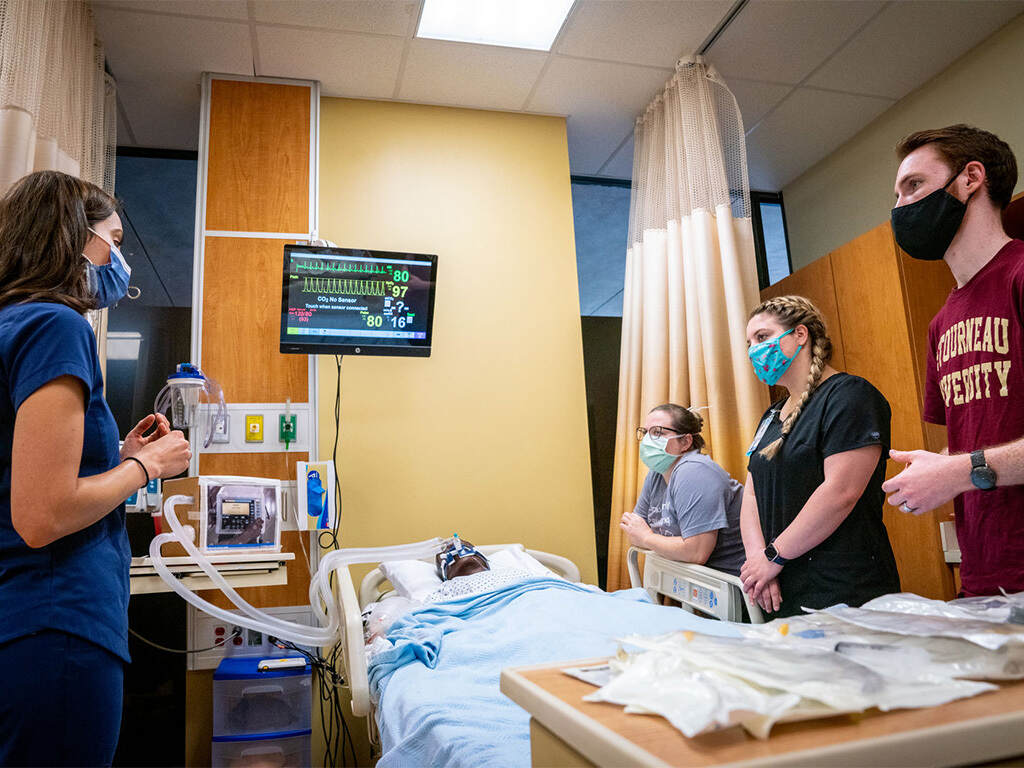 Once you have students headed in that direction, being able to express that compassion and love to people and truly accept people where they are—because in nursing, we take care of whoever it is that’s put in front of us—then you add the technology part.
Once you have students headed in that direction, being able to express that compassion and love to people and truly accept people where they are—because in nursing, we take care of whoever it is that’s put in front of us—then you add the technology part.
If anyone’s been in a hospital lately, there are machines everywhere. There are tons of diagnostic machines that we have to know about and use, and information technology is huge in nursing right now. Everyone is transitioning to electronic health records. We have one that we use in our lab that students report on. Technology has become so pervasive in our field that ‘old school’ methods stand out! We recently heard a student excited about taking a manual blood pressure test, especially because the nurses at her clinical placement assumed she couldn’t manually take it. I was so glad she didn’t need a machine (we would’ve failed miserably). Just having the technology there and teaching students how to use it, that’s not enough. The foundational, practical knowledge goes much deeper, and first and foremost, having them love people—that’s the most important.
So, while all of the tech is really important, and something we do focus on in our program, we assure students know how to use it but that they use it as a tool—not a crutch. It’s another tool in their caregiving tool belt. What we want them to be able to do is really love what they’re doing, love who they’re doing it for, and then be able to use the technology to advance their care.”
On the Future of Nursing
One of the other themes that perpetually surfaces when you talk nursing is this: there are never enough. The profession which Florence Nightingale valiantly proved the need for is needed now more than ever. But what happens when the motivations are misaligned with her original intent?
“Most people would know just from media outlets nowadays that we’re certainly short on nurses. More than 3 million additional RN positions will be available between now and 2029. That’s an astounding number. So, it’s important for us to continue putting nurses in the field of practice. I think with healthcare going the way it is today, it’s not in a great spot. If you’re involved in the field of healthcare at all, you know it’s not in a great spot.
Not only do we have a lot of shortages in the industry as a whole, with people leaving the fields of nursing, of medicine, of respiratory therapy, and so on, but we have people coming into the professions that aren’t patient focused. This means they don’t necessary bring with them the characteristics all of us would like our doctors and nurses to have. A place like LeTourneau, where we’re given the freedom to teach our students from a biblical perspective, can foster patient-first nurses in a unique way. Our graduates, those are the students that all of us are going to want taking care of us as we age. And that want is two-fold. We’re going to want them to have the compassion and love, but we’re also going to want them to be incredibly skilled.
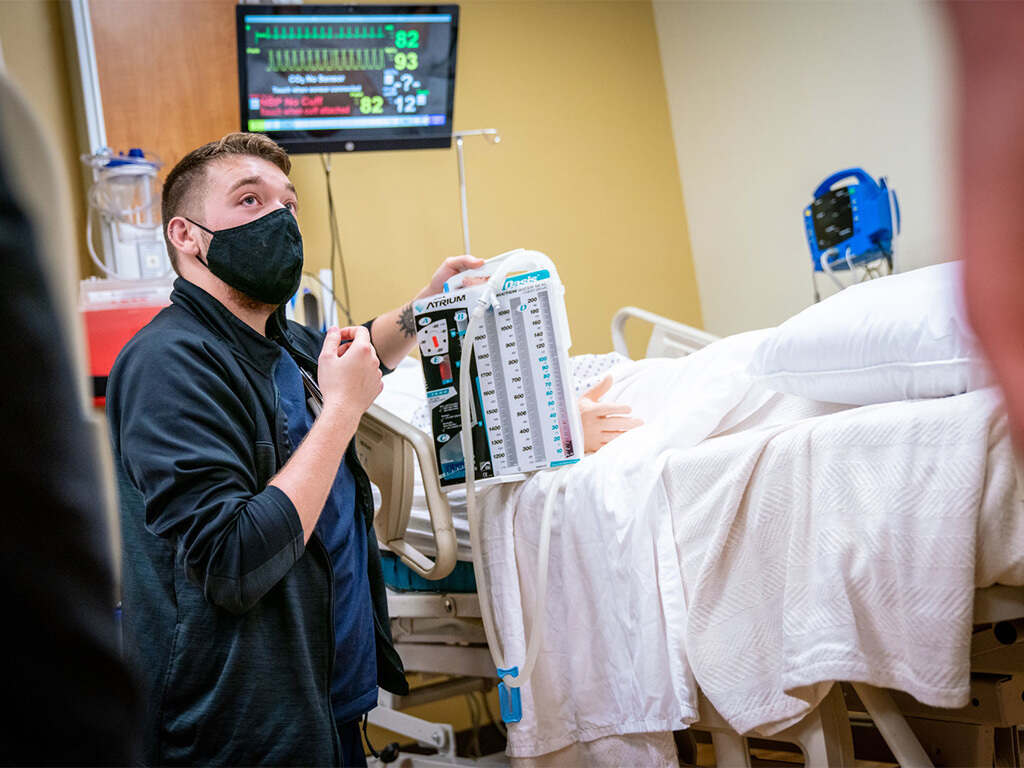
What we see in healthcare facilities right now is a culture of chaos. People don’t show up for work, short-staffing is a reality, patients are often turned away or not cared for. All of those things are really happening. I think it’s not just important to put people in positions to help solve this chaos-crisis but also for those to be people who are very competent in their field and have a heart for doing it.
The heart-factor makes a huge difference when it comes to longevity. We want our students to stay in the profession. And it’s a profession with a tremendous amount of variety! In our program, we emphasize how many different things you can do as a nurse. I always say ‘you should never get bored being a nurse!’ There are way too many options for boredom. But all the variety in the world isn’t enough to make someone love the field who truly doesn’t.
There are a lot of compelling reasons to go into the profession of nursing: demand, compensation, flexible work schedules, accessible training, active work, interesting specialties… however, I think it’s so important we consider the kind of people that are going into the healthcare areas. These reasons alone aren’t the best reasons to go into any of the caring / helping professions, but certainly not nursing. You don’t want the nurse taking care of you to be the one who’s just there for the paycheck.”
On Nursing at The Christian Polytechnic University
Quiett admits the basic foundation of a successful nursing program relies upon fulfilling requirements. There are certain rules and regulations that must be adhered to. Curriculum must follow the guidelines required by the Texas Board of Nursing or other accrediting bodies. She affirms that we do them well. But, again, that’s not enough.
“There are a few touches that LeTourneau allows us to give that make our program significantly different from what students might experience someplace else. One of those things is that if you come here as a freshman, you’re a nursing student. Even though we have a thing called ‘pre-nursing’ and a thing called ‘nursing’, we take care of all of those students. We don’t just push the freshman aside and say ‘when you get here [to that upper-level rite of passage from pre-nursing to -nursing], we will take care of you.’ We like those early students to come on in. From their freshman year, all the way through, they have a nursing faculty advisor. They’re in our building. We welcome them to come to our labs and welcome them into our nursing student organizations.
Another is that we’ve had great success. God has truly blessed our program. I can tell you every year but one, we’ve had a 100% NCLEX pass rate. The one exception was the year of COVID, when one student passed the second time she took it. That number is tremendous. And the reason we have such a good pass rate is because our faculty put the effort into that. They hold the expectation high.
I’ve always said, ‘you can set the expectation low, and a lot of students will meet it; or, you can set the expectation high, and a lot of students will meet it.’ Because they want to. They want to get there. But you must have faculty who are on board with that, and you must hold them to it. This makes the success, the accomplishment, all the richer. It’s an inside job, to foster excellence, but one clearly seen from the outside.
We have healthcare facility managers and nurse managers and supervisors who call us and specifically request to hire our students. They often want to hire our students before they even start clinical! But certainly, once they’ve seen them in clinical, they do. And I love that. I love that our healthcare institutions want our students. Why? Because patients do. And as believers, we’re held to a higher standard of care.”
Dr. Kimberly Quiett, Dean of Nursing, earned her DNS from Louisiana State University, an MSN from the University of South Alabama, and both a BSN and ADN from Samford University. She is certified as a Registered Nurse, as well as an Advanced Oncology Clinical Nurse Specialist and Clinical Nurse Specialist. She arrived at LETU in 2013, after an already extensive background in nursing education and clinical training, receiving the charge to build the LETU School of Nursing. She serves as our founding dean and considers it her ‘baby.’ She has two human daughters in college and is married to Dr. Jeffrey Quiett, who serves at LETU as a Professor of Psychology & Counseling and Director of the Counseling Center.